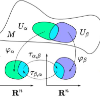This paper introduces a novel sequential inferential approach for Bayesian dynamic generalized linear models, focusing on uni- or multivariate k-parametric exponential families, which handle various responses such as multinomial, gamma, normal, and Poisson. This approach preserves the sequential nature of Bayesian paradigm for generating real-time inferences, utilizing the conjugate structure of the exponential family for computational efficiency. The framework incorporates concepts from Information Geometry, like the projection theorem and Kullback-Leibler divergence, aligning it with recent advancements in variational inference. Applications on artificial and real data demonstrate its computational efficiency. For instance, fitting and forecasting a stochastic volatility model took just 0.517s for a time series of 500 returns, outperforming alternative methods. The proposed approach accommodates new information strategically, enabling monitoring, intervention analyses, and the use of discount factors typical in sequential analyses. An R package is in development, with specific cases of k-parametric dynamic generalized models already implemented and available for direct use by applied researchers.
翻译:暂无翻译





